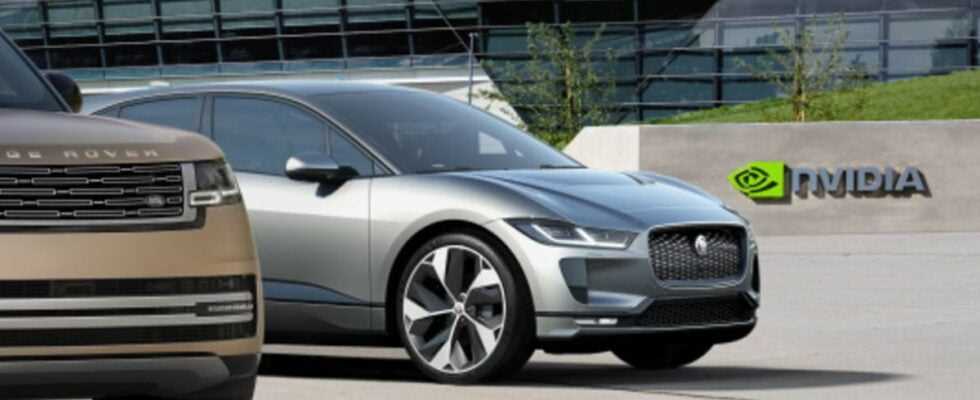4
Jaguar Land Rover and Nvidia, a major player in IT and one of the specialists in AI and automated driving, have signed a partnership agreement. The idea is to put artificial intelligence at the service of vehicles and their occupants.
If we no longer present Jaguar Land Rover, Nvidia is above all (re)known by the many users of GeForce RTX graphics cards. But Nvidia is also one of the specialists, if not THE specialist in autonomous driving via Nvidia Drive, a platform hardware become unavoidable. The approximately 350 companies using the said platform are the best proof of this. The creed is the machine learning : learn while driving. Thus, errors made are recorded and corrected by the Drive platform, which incorporates artificial intelligence.
Today, the latest versions of Drive make it possible to offer level 2+ semi-autonomous functions, whose computing power and processors have been increased in order to reinforce security and reliability.
Among the many companies that use it, there are a good twenty car manufacturers, the latest of which is Jaguar Land Rover.
Thus, the two parties signed a partnership agreement in order to “to jointly develop and deliver next-generation automated driving systems and AI-based services and experiences for its customers”.
From 2025, all Jaguar Land Rover vehicles will integrate the Nvidia Drive software platform (Hyperion 8 version). On the menu, automated driving and parking, driving aids, an artificial intelligence system at the service of the occupants as well as a “advanced visualization of the vehicle environment”.
The Nvidia Orin SoC. © Nvidia
In practice, Nvidia Drive Hyperion 8 integrates Drive AGX Orin, a SoC (processor) unveiled in 2019 that Nvidia did not hesitate at the time to qualify as “world’s most advanced processor”. The latter is capable of processing 200 TOPS on a single chip. No less than 12 CPU cores and a “new generation” graphics circuit make up the Orin chip, which itself contains no less than 17 billion transistors, more than double compared to the previous Nvidia chip intended for the automotive sector. Recently put on the market, Orin promises to simultaneously manage applications, but also artificial intelligence.
On the automaker side, the Drive AGX Orin is intended for both level 2 and level 5 autonomous vehicles. Like Xavier, the previous SoC, Orin will be programmable via APIs such as traffic light recognition. signaling and pedestrians, trajectory perception and gaze detection.
To support it in its task, a multitude of sensors including ultrasound modules, cameras, radars and, of course, the famous lidars.
In addition to the Orin SoC, the Nvidia Drive Hyperion 8 platform integrates two software, Drive AV and Drive IX. The former is dedicated to automated driving, while the latter is virtual driver and passenger assistance. The latter aims to create new experiences at the level of the dashboard and the cockpit, as well as improving safety.
We should find this same Drive IX on the next Volkswagen ID.Buzz, a modernized and electric version of the iconic Volkswagen Combi, which will be unveiled in March 2022.
Software update throughout the life of the vehicle
Another effect of this partnership is that Jaguar Land Rover will rely on solutions developed by Nvidia and its DGX supercomputers to train and train its own artificial intelligence, while Nvidia Drive Sim software will be used to create “real-time physically accurate simulations”.
The fruit of these developments specific to Jaguar Land Rover will make it possible to “to provide innovative assisted and automated driving services throughout the life of the vehicle via over-the-air software updates” (OTA).
This collaboration between Jaguar Land Rover and Nvidia is no accident. It is part of the automaker’s new strategy called “Reimagine”, presented in 2021. The important point is the production of 100% electric vehicles by 2030.

